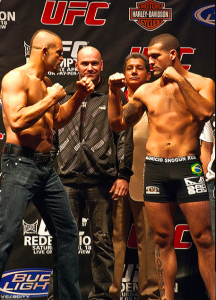 The Ultimate Fighting Championship (UFC) is one of the fastest growing fight organizations in the world. For a UFC athlete, the sky is the limit. The popularity for those well versed in boxing, kickboxing, and submission grappling can rise higher than any other professional organization in the world. These athlete’s lives are dedicated to the single-minded pursuit of perfecting their skills and building their careers within the organization. With mixed martial arts the UFC is effectively the only option.
The Ultimate Fighting Championship (UFC) is one of the fastest growing fight organizations in the world. For a UFC athlete, the sky is the limit. The popularity for those well versed in boxing, kickboxing, and submission grappling can rise higher than any other professional organization in the world. These athlete’s lives are dedicated to the single-minded pursuit of perfecting their skills and building their careers within the organization. With mixed martial arts the UFC is effectively the only option.
The UFC acts as a professional organization similar to mainstream sports such as NBA, NFL, and MLB. The organization dictates the pay scale for the athletes, controls their competition schedules, creates and enforces the rules and regulations of the sport, disciplines athletes, and has the ability to terminate the athletes’ contracts unilaterally without cause. However, unlike other professional athletic organizations, the UFC claims the athletes they control are not employees, but rather independent contractors. This allows the UFC to deprive athletes of benefits afforded to employees under state and federal law. These benefits include health insurance, retirement benefits, and workers’ compensation that most mainstream sports provide.
Workers compensation is a form of insurance that provides wage replacement, and medical and permanent disability benefits to employees injured in the course of employment. Employees can file claims for on-the-job injuries in exchange for relinquishing the right to sue. According to LA times, in 2014 there were 569 claims against NFL franchises, 283 claims against MLB clubs, 113 against National Hockey leagues, and 79 against NBA. Nearly 70% of those were alleged head or brain injuries caused by repetitive trauma.
UFC athletes sustain numerous injuries during competition and during training, including head trauma, spinal cord injuries, and serious fractures among other things. About one-third of mixed martial arts matches end by knockout or technical knockout. The American Journal of Sports Medicine found that 31.9% of UFC fights end with one fighter suffering from traumatic brain injury (TBI). The TBI rates in mixed martial arts are twice as high as those in football, three times higher than boxing, and eight times higher than hockey.
For UFC fighters, there is no compensation for their injuries, but rather an early retirement from the sport—without benefits. They pay out-of-pocket to treat their injuries and often, are unable to obtain treatment at all. The sport of mixed martial arts is young and its rise in popularity has been meteoric. However, the residual effects of these injuries will plague these athletes for the remainder of their lives. Certain injuries, such as head trauma, make former UFC athletes unable to work at all.
Several former UFC athletes are taking a stand and challenging the UFC’s stranglehold on the sport and its quest for profits at the expense of the long-term health of the very athletes that are responsible for its success. The athletes are suing the UFC claiming it unfairly used its superior marketing position to suppress athlete pay and to avoid paying payroll taxes, workers’ compensation costs and other benefits it would otherwise be required to pay if the athletes were considered employees.
The UFC controls every aspect of an athlete’s career, despite its characterization of athletes as independent contractors. While the UFC may pay certain athletes well for the time the athlete is actually fighting, it fails to account for the fact that the athlete’s health will deteriorate faster than that of the average office worker. The UFC states on their website, “Millions of people have watched our bouts, we have instituted leading health and safety measures for our athletes, and fighters are free to negotiate contract terms.” In reality athletes are not free to negotiate their contracts because UFC’s dominance of the sport is so pervasive. Basically, the UFC is the only game in town.
If the UFC is truly concerned with the long-term health of the sport it needs to be proactive with the long-term health of the athletes that helped it gain the popularity it now enjoys. This includes providing athletes with all the benefits afforded other athletes in other sports, including long-term health and workers’ compensation benefits. We understand the effects of contact and combat sports on the athlete’s health. We are shocked and saddened by the images of former NFL players suffering from Chronic Traumatic Encephalopathy (CTE), dementia, and ALS, and the news of former stars’ suicides. If the UFC fails to act and provide these benefits, the sports landscape will be littered with the broken bodies and brains of its own athletes as well.
